#norman lebrecht
Photo

The National Theatre has just announced it will ‘reduce activity’ over the next four years due to ‘financial challenges’. English National Opera is on its final year of funding. The BBC Singers have been abolished. Britten Sinfonia has launched a £1 million appeal to enable it to survive Arts Council cuts. A quarter of the seats in BBC orchestras are to be unwaged. Cities the size of Liverpool, Norwich and Southampton have been left without opera. The post-1945 English artistic renaissance has gone into abrupt reverse, without much political debate.
Darkness descends.
Discuss.
- Norman Lebrecht
The axe of cultural vandalism is in full swing against anything classical. The BBC is the biggest employer of musicians in the UK, and to lose one in five of their orchestral players will create a black hole for musicians already stymied by visa restrictions and thus wider opportunities traditionally afforded them. The end of the BBC Singers, in particular, is heartbreaking - founded nearly 100 years ago, they have given both comfort and joy to the nation.
Photo: The BBC Singers.
#lebrecht#norman lebrecht#quote#arts#BBC#culture#britain#cuts in funding#funding of the arts#BBC singers#national theatre#britten sinfonia#arts council#BBC orchestras#decline and fall
57 notes
·
View notes
Text
0 notes
Text
Norman Lebrecht: Straussov novogodišnji koncert i nacizam
Bečki novogodišnji koncert je možda jedno od poslednjih opuštenih okupljanja svetske televizije. Prvog jutra nove godine, u 11 sati i 15 minuta po centralnoevropskom vremenu, na mestu koje sebe smatra epicentrom Evrope, grupa muškaraca u svečanim odelima penje se na pozornicu Dvorane Bečkog muzičkog društva (Musikverensaal) da bi izvela ritual koji slovi za simbol kulture i tradicije. A koji,…

View On WordPress
0 notes
Photo




Nonfiction Recommendations: Jewish American Heritage Month
Black, White and Jewish by Rebecca Walker
The Civil Rights movement brought author Alice Walker and lawyer Mel Leventhal together, and in 1969 their daughter, Rebecca, was born. Some saw this unusual copper-colored girl as an outrage or an oddity; others viewed her as a symbol of harmony, a triumph of love over hate. But after her parents divorced, leaving her a lonely only child ferrying between two worlds that only seemed to grow further apart, Rebecca was no longer sure what she represented. In this book, Rebecca Leventhal Walker attempts to define herself as a soul instead of a symbol—and offers a new look at the challenge of personal identity, in a story at once strikingly unique and truly universal.
Bad Jews by Emily Tamkin
What does it mean to be a Bad Jew? Many Jews use the term “Bad Jew” as a weapon against other members of the community or even against themselves. You can be called a Bad Jew if you don’t keep kosher; if you only go to temple on Yom Kippur; if you don’t attend or send your children to Hebrew school; if you enjoy Christmas music; if your partner isn’t Jewish; if you don’t call your mother often enough. The list is endless.
In Bad Jews, Emily Tamkin argues that perhaps there is no answer to this timeless question at all. Throughout American history, Jewish identities have evolved and transformed in a variety of ways. American Jewish history is full of discussions and debates and hand wringing over who is Jewish, how to be Jewish, and what it means to be Jewish. In this book, Emily Tamkin examines the last 100 years of American Jewish politics, culture, identities, and arguments. Drawing on over 150 interviews, she tracks the evolution of Jewishness throughout American history, and explores many of the evolving and conflicting Jewish positions on assimilation; race; Zionism and Israel; affluence and poverty, philanthropy, finance, politics; and social justice. From this complex and nuanced history, Tamkin pinpoints perhaps the one truth about American Jewish It is always changing.
Genius & Anxiety by Norman Lebrecht
In a hundred-year period, a handful of men and women changed the way we see the world. Many of them are well known—Marx, Freud, Proust, Einstein, Kafka. Others have vanished from collective memory despite their enduring importance in our daily lives. Without Karl Landsteiner, for instance, there would be no blood transfusions or major surgery. Without Paul Ehrlich, no chemotherapy. Without Siegfried Marcus, no motor car. Without Rosalind Franklin, genetic science would look very different. Without Fritz Haber, there would not be enough food to sustain life on earth.
What do these visionaries have in common? They all had Jewish origins. They all had a gift for thinking in wholly original, even earth-shattering ways. In 1847 the Jewish people made up less than 0.25% of the world’s population, and yet they saw what others could not. How? Why?
Norman Lebrecht has devoted half of his life to pondering and researching the mindset of the Jewish intellectuals, writers, scientists, and thinkers who turned the tides of history and shaped the world today as we know it. In Genius & Anxiety, Lebrecht begins with the Communist Manifesto in 1847 and ends in 1947, when Israel was founded. This robust, magnificent volume, beautifully designed, is an urgent and necessary celebration of Jewish genius and contribution.
People Love Dead Jews by Dara Horn
Renowned and beloved as a prizewinning novelist, Dara Horn has also been publishing penetrating essays since she was a teenager. Often asked by major publications to write on subjects related to Jewish culture—and increasingly in response to a recent wave of deadly antisemitic attacks—Horn was troubled to realize what all of these assignments had in common: she was being asked to write about dead Jews, never about living ones. In these essays, Horn reflects on subjects as far-flung as the international veneration of Anne Frank, the mythology that Jewish family names were changed at Ellis Island, the blockbuster traveling exhibition Auschwitz, the marketing of the Jewish history of Harbin, China, and the little-known life of the "righteous Gentile" Varian Fry. Throughout, she challenges us to confront the reasons why there might be so much fascination with Jewish deaths, and so little respect for Jewish lives unfolding in the present.
Horn draws upon her travels, her research, and also her own family life—trying to explain Shakespeare’s Shylock to a curious ten-year-old, her anger when swastikas are drawn on desks in her children’s school, the profound perspective offered by traditional religious practice and study—to assert the vitality, complexity, and depth of Jewish life against an antisemitism that, far from being disarmed by the mantra of "Never forget," is on the rise. As Horn explores the (not so) shocking attacks on the American Jewish community in recent years, she reveals the subtler dehumanization built into the public piety that surrounds the Jewish past—making the radical argument that the benign reverence we give to past horrors is itself a profound affront to human dignity.
#jewish american heritage month#jewish heritage#judaism#nonfiction#nonfiction books#Nonfiction Reading#history#Reading Recs#reading recommendations#Book Recommendations#book recs#TBR pile#tbr#tbrpile#to read#Want To Read#Booklr#book tumblr#book blog#library blog
40 notes
·
View notes
Text
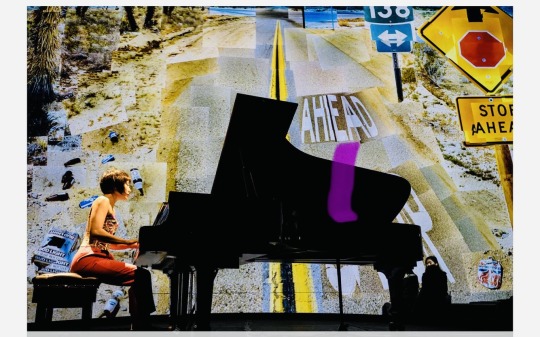
Very intriguing piece about a concert that recently took place that suggests a possible new direction for live performances. Wish I'd been there to see it for myself.
2 notes
·
View notes
Text
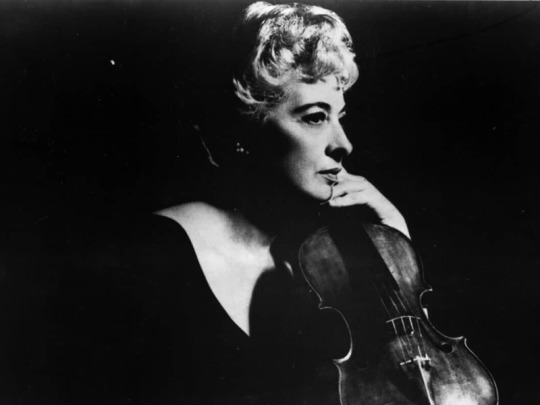
HOLLYWOOD’S FIRST FEMALE CONCERTMASTER
Violinist Eudice Shapiro served as concertmaster for RKO, Paramount Pictures, and United Artists – and she was the first woman to hold the position for a major Hollywood studio.
– Slipped Disc's Norman Lebrecht
0 notes
Text
Dogs wanted for orchestral audition - SlippediscSlippedisc
New Post has been published on https://petn.ws/awHnE
Dogs wanted for orchestral audition - SlippediscSlippedisc

norman lebrecht March 31, 2023 Only Danes could post this without cracking up: Audition: We are looking for dogs to participate in a concert during the Haydn Festival 2023 When we, together with chief conductor Adam Fischer, welcome you to this year’s Haydn Festival on 1 – 3 September, there will be very special four-legged […]
See full article at https://petn.ws/awHnE
#DogNews
0 notes
Text
Three drop out of BBC Prom - SlippediscSlippedisc
Three drop out of BBC Prom – SlippediscSlippedisc
norman lebrecht
July 27, 2022
This Saturday’s Prom has lost three key singers, says the BBC:
Prom 19 (Saturday 30 July)
Daniela Barcellona, Ivan Gyngazov & Jung Soon Yun have withdrawn from Prom 19: Puccini’s Il Tabarro. They are replaced by Annunziata Vestri, Adam Smith & Shengzhi Ren respectively.

View On WordPress
0 notes
Photo
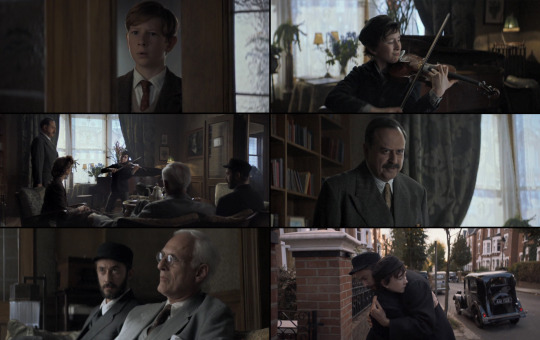
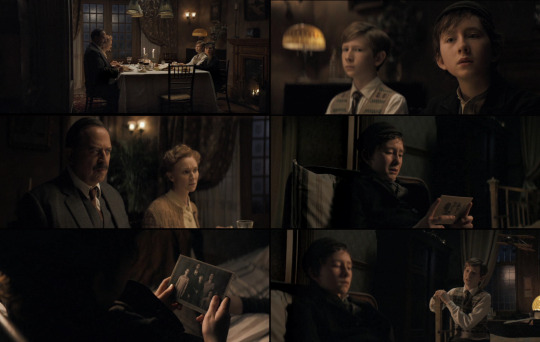
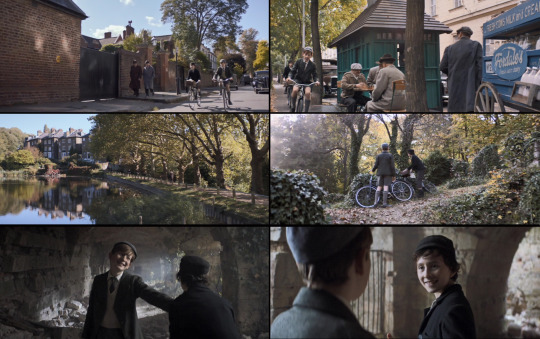
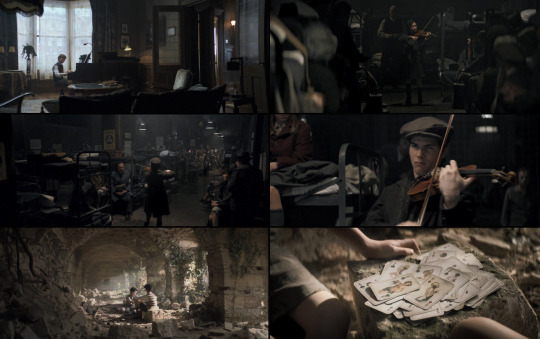
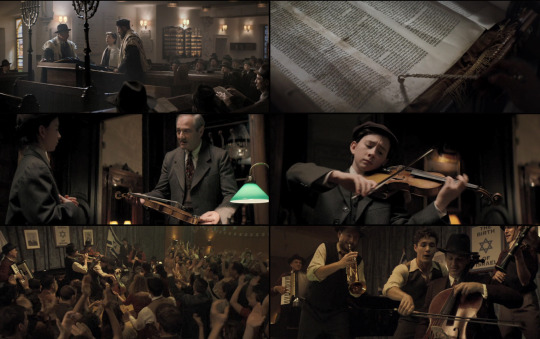
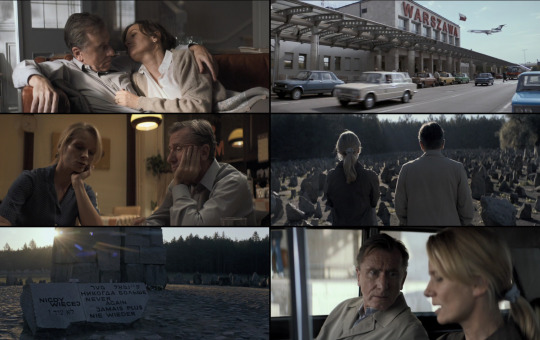
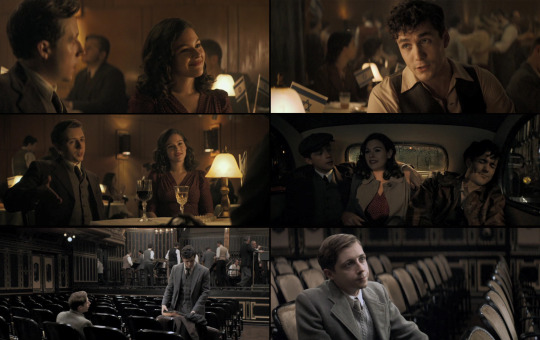
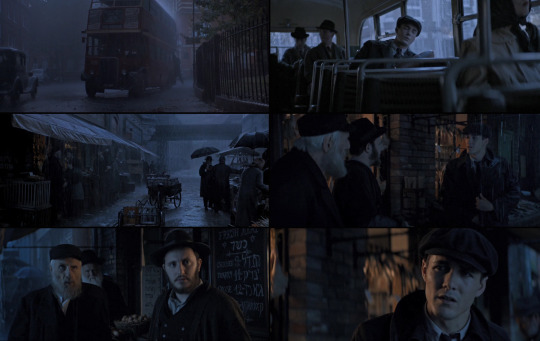
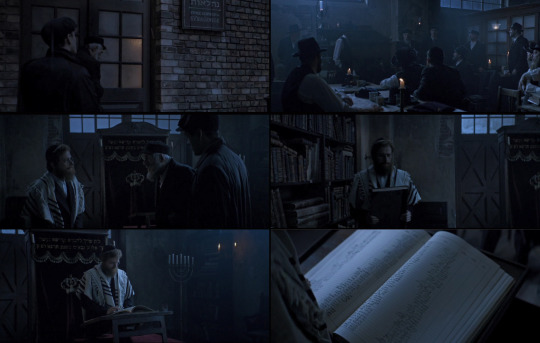
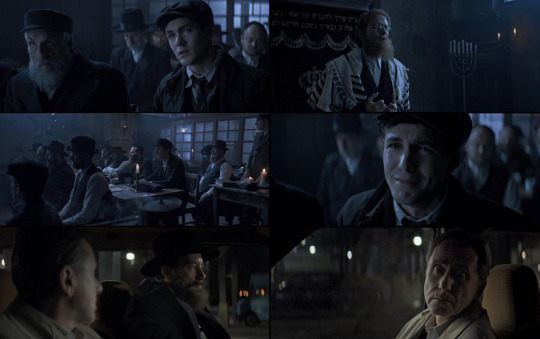
The Song of Names (2019)
#the song of names#holocaust#book adaptation#Norman Lebrecht#World War II#world war ii film#drama film#holocaust film#Tim Roth#Jonah Hauer-King#Luke Doyle#movies to watch
14 notes
·
View notes
Text
Leave me alone!
WARNING: This post is a venting-out of boiling anger, which can amount to mental illness. Maybe not for those weak of heart, but for sure for those who caused me so much anxiety, and contrarily, those who want to help me out of this. As for everyone else, read and suffer.
Well, corona, the world is practically on fire, and what else... Oh yes. Things in the relatively more intimate world (that is, for me) - namely, school, my followings on Instagram, YouTube and email subscriptions - keep bothering me to an incredible extent. I was wanting to write this blog post since March honestly, but I didn't find the time and the need to vent everything out. Now, though, that I am really mad, I'm somewhat thankful for the opportunity, because I'm making my opinions known, and merely hoping that they get more circulation than before.
My main classical music following had been Deutsche Grammophon and Decca (through email and Instagram, and - in the case of the latter - 2 YouTube channel subscriptions), the Berlin and Vienna Philharmonic Orchestras (Instagram), Norman Lebrecht's Slipped Disc (email) and the ClassicsToday.com editor David Hurwitz (YouTube viewing). All of the following had, to a certain extent, drive me insane in the past few months, in ways that I can't describe (one time with Hurwitz, it was so much so I needed to vent my anger in this very outlet). To a certain extent, for those who remember, the same happened with the Mahler Foundation in May, but since writing that post, I've come to realize that not only this is pretty much not important (at least much less than it seemed at the time), there are far worse issues that I'll need to address (I won't yet, perhaps to get more reading and get the image fixed, but I'm hoping I will address this important issue relatively soon). My great bane with the BPO and VPO, but especially with DG, came around the time of the Salzburg Festival in August, which was itself a bane all by itself, but by having these 3 leading musical institutions being an important part of the Festival just made me go bonkers. I don't really had a problem with the Festival being held at the time, when corona cases where relatively low, as long as the Festival was being sensitive, and did things on a much smaller scale as they had said at the beginning that they would. But the moment that they do Elektra and Mahler's 6th, whatever social distancing there would occur in the audience, with so many people onstage and/or in the pit, they're just calling for trouble. It is indeed something of a miracle that there were no casualties during the Festival, but I really think it would have been smarter not to take the risk, whatever the need for culture (besides, probably only those who would attend are those who are "jet-set" and are in Salzburg every year for the wrong reasons, but I will maybe discuss that sometime). The Vienna Philharmonic were therefore one of the major partners in the crime, more so than their Berliner counterparts. But, and this is the important part, I would very much in my hoped-for career as probable pianist and maybe composer, but most as conductor, want to collaborate with the Berliners and the Viennese. They are orchestras that I maybe don't need, but I do want to make music with. The same thing can't really be said for Decca and, more importantly, DG. Interestingly, Decca almost seems dead in the way that they rarely post on Instagram, sent a newsletter or upload on YouTube, while DG is excessive beyond normal human standards. I think they post on Instagram averagely 3 times a day, upload on YouTube twice, and send a newsletter each weekend. How the hell can you bear such a thing?! There are more adventurous labels with pretty "big names" (Alpha, Chandos and Hyperion, to name just three), that I would feel more comfortable to record with, than DG, Decca and probably also Warner (I don't follow them anywhere, which is probably just as good, considering the pervious sentences).
In addition, throughout the Festival the Karajan institue also helped to bring in their own click-baiting and "martyring" of their namesake. My attitude to Karajan as man and conductor is more mixed than it was in the past (most of which can be attributed to Lebrecht), but ever since then they made me emotionally sick with statements to the effect that Karajan was the greatest conductor ever. I have to admit that I'm much more of a Bernstein fan, and that I had barely listened to Karajan recently, but the Bernstein Offices never, apart from the centenary, did interviews of the Karajan kind, and even I'm going to admit that some Bernstein interpretations are less well than some others, maybe even than Karajan's!
So now with the Salzburg band-wagoning out of the way, there are two other culprits: Hurwitz and Lebrecht. I've encountered Hurwitz fairly recently, and I should add, that I have rather mixed relations towards him. One day in the morning, I see a video he uploaded and it makes me absolutely mad (see the link above), and then in the evening he uploads a humorous roast with which I completely agree. But generally, I'm just mixed with him. My relation to Lebrecht is also mixed, though generally positive. He has just finished a survey of most of Beethoven's output. However, his behavior regarding the "Schenker storms" is either complete misunderstanding or just outright conservative foolery.
There are 2 other "classical music" personalities which I have to mention. My relation with Mark Berry is very mixed, but he hasn't bothered me as much since March, as the main activity on his blog Boulezian (shows pretty much where he is heading) is concert and opera reviews, and he didn't have much of a chance to that, so I'm thankful for that. I will give him credit though that he is actually one of 2 people whose blogs gave me the impetus to start mine.
The other one is the other "classical music" personality I want to talk about briefly, Kenneth Woods. He is music director of the Colorado MahlerFest, the English Symphony Orchestra, and writer for his blog View from the Podium. I like him very much, as I share a lot of his musical affinities - Mahler and Shostakovich, to begin with - as well as professional insights into music of (among many others) Strauss and - perhaps more importantly from an interpetive point of view these days - Beethoven. I kind of just happen to agree with many of his opinions, and even those which I didn't think of before, I agree with them because they make sense to me. I think that the reason he appeals to me, is because he's a conductor and a cellist (also used to be a guitarist, and does it in his free time!). With the exception of Hurwitz, who was a percussionist in local orchestras, everyone else I mentioned above are scholar-critics. Woods appeals to me because he's a practical musician (and he keeps a rule not to talk about any living conductors, or at least not mentioning them by name). He was an orchestral cellist, as well as a soloist and chamber music partner as well, so he experiences the actual music world of making music from both sides, as cellist and conductor. Hurwitz, Lebrecht and Berry all might have interesting observations, but their ultimate test is in the performance lab, and that is why I like Woods so much.
So far, I've dealt with classical music's personalities and industry. Now I have to deal with my friends and other Instagram followings. It's more irritating, because even though they are dishonest like the "establishment-industry", they are closer in my world in a sense. Yom Kippur was recently, and I can still remember everyone around just going "I'm sorry, God" and all the other standard things one says before Yom Kippur. WHO THE HELL ARE YOU KIDDING!!! Everyone, especially yourselves, know that we promise never to do these things again, and barely an hour has passed since Yom Kippur is out, and we come back to do those things again. Every year it happens. Everyone knows it, it is simply an open secret that nobody either needs or wants to say. I say the same on myself, by the way. Yom Kippur is a complete lie for us, because neither me, you, and even the most just and Mitzvah-keeping person on Earth, are able to keep the promises that we will get better than this. It never happens. Why do we get flodded with this? It's absolutely no worth. You say that you're "sorry about the way I insulted you"? Complete rubbish. Unless you found out that the entire situation was so stupid you can laugh about it, nobody is sorry about anything they said. The king is naked, and as the meme says, "always has been".
My classmates start growing on my nerves sometimes. The way people just ask for answers so immediately and lazily, without having tried to answer things themselves just makes me go mad. I don't have a problem if they try to do it, or if they're in a rush at the last moment, and ask some guys for answers. But when as soon as the assignment is sent, they ask for someone to do the job for practically 10 other classmates (if not more!), that's too annoying.
My teachers, however, go on a different way of making my life difficult. They don't really annoy me by poking their selfish faces at me as much as expecting me to do everything perfectly. Even those who are kinder (in a sense, since I'm one of the good boys, so kinder practically means that they teach better or are more interesting) make me mad. There are only 2 teachers (another comes close) in the entire school I'm able not only to appreciate, but also to love learning with them. Fortunately, one of them is my homeroom teacher. Without these few teachers, I wouldn't care about school at all. It could just go to hell. We currently have a shutdown, but I still remember a few weeks ago that during a math class, I needed to read my score of Shostakovich's 4th just to keep myself from making my mental health even worse than it was (and probably still is). And even during shutdown, things are not improving. Zoom calls were to be a complete waste of time, were it not for my piano lessons and (sometimes) therapist sessions. History class is especially badly taught. The teacher of that class is of the kind of "the smaller the group - the better", because when I was with her in smaller groups she truly was better. Mind you, I'm the nerd guy who loves history (though I'm probably not the only one in our class), and she managed to make history boring. That's a complete failure. Sports class is a complete waste of time in ways I can't really describe. You can only feel it.
I have though been somewhat fortunate since May and June. Because of my critique of the Mahler Foundation and its online Festival, I've got in touch with a 8th-grader (they/them) from Canada, an a college sophomore in English literature from Florida. We three formed an online gang of just us, getting together on the basis of our love for Mahler and Shostakovich. With their advice, having understood that I will need some really fitting music to get me through the year, I've decided that I will listen on my way to and back from school, as well as during breaks, to listen to nothing but Shostakovich. That plan sort of fell through pretty quickly (by which I mean, only 3 days), but Shostakovich was a great part of my phone repertoire in these first 3 weeks of the school-year. In the last week, however, Henze's Fantasia for Strings took over, and it was somewhat fitting, given that the music began its life as Henze's score for Young Törless, an adaptation of the novel by the fairly similar name of Robert Musil, by Volker Schlöndorff (his directorial debut). These two, the 8th-grader and the sophomore, are practically my main lights these times, when we sometimes meet for a call on Discord at night.
However, these few lights are still engulfed by the complete darkness and hypocrisy that surrounds me now. I've had enough! My complaints go out now especially to the education system in this country which is just reacting horribly to the situation! I can simply go crazy from that! All the Instagram personalities, do me a favor, and please do consider those who are probably less well mentally than you are, and stop showing the way you're enjoying yourselves in pools and parties. And cut the "no filter" crap! If something would have really been with no filter, it would be ordinary and dull. To quote Alex Ross, who in turn paraphrases Nietzsche, I'm done with "the lie of the grand style". Less Wagner (in his conservative bits) and his idiotic imitators, Brahms, Mendelssohn, and all those who thought that music stopped with Beethoven, more Mussorgsky, Scriabin, Schoenberg, Berg, Webern, Satie, Stravinsky, Bartok, Shostakovich, Weill, Hindemith, Weinberg, Bernstein, Britten, Nono, Berio, Henze, Messiaen, Lutoslawski, Ligeti, Penderecki, Schnittke, even Boulez and Cage. And please do more meaningful Bach, Vivaldi, Mozart, Haydn, Beethoven, Schubert, Schumann, Berlioz, Liszt, Bruckner, Tchaikovsky, Mahler, Richard Strauss, Debussy, Ravel and Sibelius.
(Quick sidenote: I have to admit, that this post was written in turns, I wasn't commited to write it. Sometimes I got super angry and vented.)
A few days ago, my sophomore friend sent me a link to a Discord server, where she, the 8th-grader and a couple other friends were part of, and asked me if I would join in. I said I would join gladly. This is my first Discord server, and therefore I've got 4 other friends. This is where I feel at home, where I belong (not in terms of family, thank God, but in terms of friends). I really do prefer being with them than with my classmates.
Our educational system is either a joke, or a gulag. What is the point to have being taught the material on Zoom, for averagely 6 and a half hours a day, 5 days a week, and putting even more workload on us than we had been in school physically, and even more than when we studied online from March to June! And then they expect us to ace through the final exams that we have in the next 2 years! Once in the past few months, I've once wondered about a question: would I prefer to ace my exams, but thereafter being so mentally and emotionally shocked that I will need psychaitric treatment? Or should I not do them at all, but still being able to do what I love doing and be happy with myself? After thinking about it for several seconds, I answered that I would prefer the latter, and ever since then I've been saying this to certain people around me unhesitatingly.
Leave me alone! I'm not able to cope with all of this! I'm feeling so empty, I don't even want to eat a whole ton, sleep a lot, or even die! I'm just empty! I'm barely able to play the piano (that is mentally), I just get tired of it almost immediately! I don't want this to happen! Everything loses its appeal to me!
Over the past few weeks, I've come to know Shostakovich's 8th String Quartet, one of the most autobiographical and depressive pieces ever written. It was composed in 1960, when he had just returned from bombed-out Dresden, where there was a movie filmed about the last days of World War II to which Shostakovich composed the music, but more importantly, it was not long after he had suddenly joined the Soviet Communist Party (probably forced to). These 20 minutes of the quartet feature throughout a musical motif - the pitches D, E-flat, C, B-natural. In German notation they are D, S (in German it's actually Es, but the pronounciation is the same), C, H (B is used in German for B-flat). The composer's name, as rendered in German is: Dmitri Schostakowitsch. This is not the first time he has been consciously using this motif (he had already been doing so for nearly a decade), but this is the most extensive use he has ever made of it. It's as if he is obsessed with himself. Shostakovich, as a result of joining the party, was obsessed with suicide, and most of his works from there on consider death, in a way he rarely did previously, death for completely fatalistic reasons, nothing to do with the authorities. The 15th String Quartet, his last, is even bleaker.
The basic point is that ever since I came to know this piece and the school year started, I've used the slogan DSCH as a symbol of protest. I can still remember having half-done math homework, and before scanning them and sending, I scribbled DSCH clearly and furiously across the top of the first page.
The last movement of Shostakovich's 8th String Quartet, a slow fugue on a theme beginning with the DSCH motif, is the movement in which Shostakovich seems to obsessed with this motif the most. And all I can say is that for the past two months, if not even more, I've been wanting to just say "Leave me alone!" for eternity, like DSCH in that movement. Leave me alone! Leave me alone! Leave me alone! Leave me alone! Leave me alone! Leave me alone! Leave me alone! Leave me alone! Leave me alone! Leave me alone! Leave me alone. Leave me alone. Leave me alone. Leave me alone. Leave me alone. Leave me alone. Leave me alone. Leave me alone. Leave me alone. Leave me alone....leave me alone...leave me alone....leave me alone....leave me alone.....leave me alone..... leave me alone..... leave me alone..... leave me alone....... leave........... me.......... alone......... leave......... me........ alone....... leave....... me....... alone............ leave............ me............. alone................ leave.............................. me.............................. alone..............................
leave me alone
#vent#salzburg festival#david hurwitz#classicstoday#norman lebrecht#slippeddisc#mark berry#boulezian#kenneth woods#mahler foundation#henze#shostakovich string quartet 8#dsch#coronatime#corona time#gustav mahler#dmitri shostakovich
4 notes
·
View notes
Text
Genius & Anxiety: How Jews Changed the World
Genius & Anxiety: How Jews Changed the World
Want to give the history lover in your life an amazing Hannukah present? Author Norman Lebrecht has collected some of the most amazing stories of Jewish people who have contributed heavily to the world as we know it. Focused on the period of time between 1847-1947, Genius & Anxiety tells the story of how Jewish people have changed the world.
The book includes stories including the well known…
View On WordPress
3 notes
·
View notes
Text
Hosting a Graduation Party on a Tight Budget

Do you have a child graduating this year? Do you want to host a graduation party to celebrate but your budget is tight? Hosting a graduation party on a tight budget can still be memorable and fun! Consider the following tips for inspiration. Remember have fun! This is a celebration not a chore. With some … Continue reading “Hosting a Graduation Party on a Tight Budget”
7 notes
·
View notes
Link
Genius & Anxiety: How Jews Changed the World, 1847-1947 by Norman Lebrecht
US: https://amzn.to/38M413U
UK: https://amzn.to/2PNOKXn
#jews and judaism#jewish history#history#Norman Lebrecht#books#book review#Genius & Anxiety: How Jews Changed the World 1847-1947
0 notes
Note
Suggestions for books about the world of classical music, fiction or non? I find it super interesting and I figured you'd be the right person to come to.
Not to be extremely on-brand, but the obvious choice is Tolstoy's Kreutzer Sonata. The Noise of Time by Julian Barnes and The Time of Our Singing by Richard Powers are the other good ones that come to mind—and I fucking loved Burgess' Mozart & the Wolf Gang but I wouldn't recommend it to anyone who isn't a Burgess stan (I'm talking Re-Joyce and Napoleon Symphony, not just A Clockwork Orange). As a rule, when it comes to books about classical music, I get my kicks with nonfiction, because nothing beats good music writing:
Bach: Music in the Castle of Heaven by John Eliot Gardiner
Wondrous Strange: The Life and Art of Glenn Gould by Kevin Bazzana
The Maestro Myth by Norman Lebrecht
Fryderyk Chopin: A Life and Times by Dr. Alan Walker
Sticking It Out: From Juilliard to the Orchestra Pit, A Percussionist's Memoir by Patti Niemi
Wagnerism: Art and Politics in the Shadow of Music by Alex Ross
Absolutely on Music: Conversations by Haruki Murakami
Mozart's Starling by Lyanda Lynn Haupt
Musicophilia by Oliver Sachs
#i got little lady with a big drum and jan caeyers' beethoven bio but i cannot vouch for them until i read them#IF YOU KNOW OTHER GOOD ONES PLEASE PUT YOUR KEYS IN THE FISHBOWL#classical music#i read much of the night and go south in the winter#anonymous#assbox
34 notes
·
View notes
Text
2020}~ A nevek dala teljes filmek magyarul online videa film hd
A nevek dala (2020) Teljes Film Magyarul, A nevek dala teljes Indavideo film, A nevek dala letöltése ingyen Nézze A nevek dala film teljes epizódok nélkül felmérés. Meg lehet nézni az interneten A nevek dala teljes streaming. Lesz ingyenes élo film A nevek dala streaming HD minoségu nélkül letöltheto és felmérés. Miért a legtöbb ember rossz nézni A nevek dala? Könnyen methode nézni A nevek dala teljes film online ingyen. Ez az oldal a legjobb hely nézni A nevek dala interneten. Folyamatosan frissítjük listája teljes hosszúságú filmeket
youtube
A nevek dala Teljes Film ➤ [ GOOGLE DRIVE ]
A nevek dala Teljes Film ➤ [ Filmek-Online ]
KANADA, MAGYARORSZÁG Szerintetek: 13+ | 113" | Premier (HU): 2020.02.06.
| Big Bang Media Dráma RENDEZŐ: François Girard ÍRÓ: Norman Lebrecht
FORGATÓKÖNYVÍRÓ: Jeffrey Caine ZENE: Howard Shore SZEREPLŐK: Tim Roth , Clive
Owen , Matt Devere , Kamil Lemieszewski , Saul Rubinek , Eddie Izzard ,
Catherine McCormack
Tartalom : A két kontinensen játszódó, mintegy ötven év eseményeit magába sűrítő detektívtörténetben két Oscar-várományos színész, Tim Roth (Martin) és Clive Owen (Dovidl) játssza a főszerepet. Lebilincselő dallamok kíséretében elevenednek meg a filmvásznon a háború szörnyűségei, miközben a cselekmény a barátság erénye mellett a szószegés és könyörületesség kérdését is körüljárja. Mindeközben kiderül, hogy olykor a zene az egyedüli eszköz, ami segíthet fényt deríteni a valóságra, s a zeneszó igazi gyógyír a léleknek.
A nevek dala elozetes | A nevek dala port | A nevek dala online magyarul | A nevek dala teljes film | A nevek dala mozicsillag | A nevek dala megjelenés | A nevek dala bemutató | A nevek dala film online | A nevek dala indavideo | A nevek dala magyar elozetes | A nevek dala online film | A nevek dala online filmek | A nevek dala online magyar | A nevek dala szereplok | A nevek dala online film online filmnézés | A nevek dala teljes film online | A nevek dala teljes film magyarul | A nevek dala youtube | A nevek dala teljes film online magyar szinkronnal
A nevek dala,
A nevek dala online,
A nevek dala előzetes magyarul,
A nevek dala ingyen letöltés,
A nevek dala netmozi,
A nevek dala,
A nevek dala magyar premier,
A nevek dala film online,
A nevek dala teljes film,
A nevek dala teljes film videa,
A nevek dala indavideo,
A nevek dala magyarul online,
A nevek dala teljes film magyarul indavideo,
#A nevek dala teljes film magyarul indavideo#A nevek dala magyarul online#A nevek dala indavideo#A nevek dala teljes film videa#A nevek dala teljes film
1 note
·
View note
Text
New from Al and Linda Lerner on Movies and Shakers: The Song of Names
This is not technically a Holocaust movie, but it plays a pivotal role. The focus is on two boys, their association with classical music and their estrangement from childhood to 30 years later.
Director François Girard (The Red Violin, Thirty Two Short Films about Glenn Gould) structures the film with Martin, as an adult, telling the story with flashbacks. It’s based on the novel by Norman Lebrecht with the screenplay written by Jeffrey Caine. There is more dialogue than music in this film about a talented violinist.
Clive Owen and Tim Roth are the stars of the film. They play the adult versions of Dovidl, a young, Jewish, boy from Poland who is a violin prodigy and Martin, the son of music teacher, Gilbert Simmonds (Stanley Townsend) an English non-Jew who wants to help the young Pole pursue his unique talent.
The opening scene shows young Dovidl and his uncanny ability to play the violin so expertly at such a young age, it is awe inspiring. Staying in London to pursue his music ends up saving his life. When World War II gains momentum, young Dovidl (Jonah Hauer-King) is beyond Hitler’s lethal grasp. But his family in Poland is not. When the letters from his parents stop coming, he worries about what has happened to them, but stays safe, continuing his studies in London.
As he continues living with this family, Dovidl is raised as the brother of Simmond’s son, Martin (Gerran Howell) who is jealous of the attention Dovidl and his talent is receiving. Simmonds even promotes Dovidl to follow his religion by studying Hebrew and having a Bar Mitzvah.
When Dovidl turns 21 Martin’s father puts all his faith and money into a 1951 concert to introduce this magnificent talent to the world. Dovidl never shows. We find out late in the film why and the consequences for Simmonds and his family. The film becomes like a detective story with Martin, now adult (Tim Roth) obsessed about finding the “brother” who disappeared for the next 30 + years.
Catherine McCormack, as Martin’s wife, is worth noting. She doesn’t think Dovidl is worth all the effort her husband exerts trying to find him. She has a wry, sarcastic way about her. She looks past Dovidl’s talent and sees a self-centered, egotist who has driven her husband crazy.
Clive Owen doesn’t show up at all until the last quarter of the film when Martin finally finds him. We find out why he never showed up for the concert which becomes the reason the film is called The Song of Names. The scene showing what made Dovidl realize what happened to his family in Poland is gut wrenching. It’s a list of names of those men, women and children who died at the hands of the Nazis.
Tim Roth is obsessive, but not very emotional in his characterization. You really don’t know if it’s out of curiosity, revenge, or that he cares. Martin, now a music teacher, notices how a student handles the rosin treating the strings of the violin bow. He does it in a particular way, just like Dovidl which is how he picks up the trail of his long-lost violinist.
When Martin finally finds Dovidl, we’re not sure he was worth the effort either. Clive Owen tries his best, but the script keeps beating him down. His is simply a grim, lifeless, dead-eyed character. That said, some of the most interesting moments of the film are watching Clive Owen make us believe he is competently playing the violin. Owen worked with a violinist who taught him how to finger each note and the complicated technique to play the difficult music. To laymen (like us) his bow and finger work appear in sync with the music track.
Director François Girard has experience helming music-themed films and there score for this film is almost better than the story. Music Department and Sound Track composer Howard Shore is responsible for the score.
The exposition of Dovidl’s tortured “survivor’s guilt” comes late in the movie. The explanation of what the title (Song of Names) really means should have been a climax for this script, but it is a prelude to the final act that is unsatisfying; much like the whole film. It skips around too much and distracts from the impact it could have had about those who died in during the Holocaust as well as the survivors. We think this film needed to build to a much more dynamic crescendo.
Sony Pictures Classics 113 Minutes PG-13
youtube
from Movies and Shakers https://ift.tt/2NdqL3C
from WordPress https://ift.tt/2QJANve
via IFTTT
1 note
·
View note
Text
youtube
Watch the American Climate Leadership Awards 2024 now: https://youtu.be/bWiW4Rp8vF0?feature=shared
The American Climate Leadership Awards 2024 broadcast recording is now available on ecoAmerica's YouTube channel for viewers to be inspired by active climate leaders. Watch to find out which finalist received the $50,000 grand prize! Hosted by Vanessa Hauc and featuring Bill McKibben and Katharine Hayhoe!
#ACLA24#ACLA24Leaders#youtube#youtube video#climate leaders#climate solutions#climate action#climate and environment#climate#climate change#climate and health#climate blog#climate justice#climate news#weather and climate#environmental news#environment#environmental awareness#environment and health#environmental#environmental issues#environmental justice#environment protection#environmental health#Youtube
17K notes
·
View notes